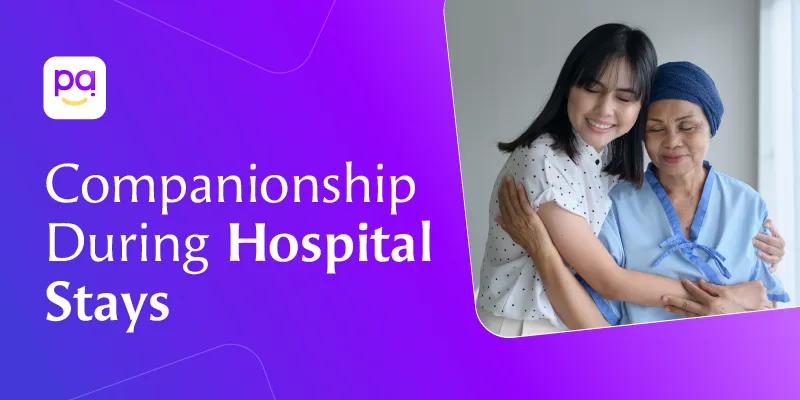Companionship During Hospital Stays
In This Article
Companionship During Hospital Stays
Pragati
Updated on September 28, 2024
Medically verified by
Fact checked by

General
6 min read
When a patient is admitted to a hospital, they usually go through a series of procedures, the first of which is an evaluation by medical specialists to ascertain the degree of care that will be needed for them. Numerous factors, including acute diseases, chronic disorders, operations, and emergency situations, can result in hospital admissions.
While the Patients are admitted in the hospital most of them often deal with loneliness and isolation all around the world, which may hamper their ability to heal. Although doctors focus on patients' physical health, what about their mental health? Here's where the role of PA-companions come in handy, providing hospitalized patients with company and assistance. The importance of Pa's in healthcare settings is examined, along with how they improve patient experiences and aid in overall rehabilitation.
Hospitals usually offer everything, including experienced medical staff, high-technology, and clinical care. But as the patient's physical demands are important their emotional needs are too. It has been seen that a patient's mental health may have a negative impact on their course of treatment.
In addition, older patients who live distant from their loved ones or have limited family support are more prone to experience an emotional collapse while in the hospital. Pa companion provides both practical and emotional support during hospital visits in an effort to close this gap.
What Does Pa Do?
Pa companions offer healthcare services important for patient’s well-being by focusing on the innovative solutions and reliable strategies and not just on medical and emotional care but on social support as well, no matter where the families or loved ones are living or located. Resulting in ending the gap of being distant Further, Pa’s responsibilities include:
Emotional Support
Pa companions create a comfortable environment for conversations, providing a listening ear, and offering comfort to patients who may feel anxious or depressed.
Physical Assistance
Pa companion helps the patients with daily activities such as eating, moving around, or using technology to communicate with family and friends.
Recreational Activities
Pa companions help to organize, also try to involve patients in activities that keep them mentally stimulated, such as book reading, playing board games for brain stimulation , or watching motivational speeches or movies.
Advocacy
Pa companions serve as bridge between patient and medical team. Taking the guarantee to ensure the requirements and lessen the worries.
Trustworthy companionship
Pa Companions are safe and sound as they are youngsters who are qualified as well as educated aged from 20-38 years. Transportation for the patients: PA also serves as travel companions during the patient’s healthcare journey. This ensures assistance for patients with safe transportation.
Navigate healthcare system
Pa offers guidance to the patients according to the medical records and by following the healthcare professionals advice. The Impact of PA Companionship on Patient Recovery Investigations have shown that there is a solid relationship between mental and physical health. By regular Pa companionship which comes with all greatly accelerates a patient's healing process because it makes them happier and more optimistic. Therefore, Pa companionship advantages are:
Reduced Anxiety and Depression
Pa companions gains the patient’s trust and shows them that there is someone to talk to or share inner feelings to remove the feelings of sadness and depression. which are common among hospitalized patients. Better Treatment Compliance: Patients who are admitted in hospitals if they experience encouragement which can be given by us, the Pa companion’s, are more likely to follow their treatment regimens and take their prescription drugs on time.
Quicker Recovery Times
If the patients in hospitals feel connected they may show better emotional states to both faster recovery times and better general health. This can be achieved by having a PA companionship by your side.
Lower Rates of Readmission
Patients who have emotional support are less likely to return for the same illness, which eases the burden on family and patient itself and PA-companions help you in every step taken so that return to hospital can be avoided.
 3 min read
3 min readHow Companionship Benefits the Elderly
 7 min read
7 min readCare For Your Family From Anywhere: Pa Companions Are Here For You
 7 min read
7 min readEmpowering Elders: The Role of Companionship
Get a Callback Now
Training and Support for Pa Companions
Pa companions undergo essential training programs and to continuous support and solve the patient’s issues. Some of the Pa Training schedule includes-
Communication Skills
We include Powerful approaches to interact with patients and offer comforting techniques.
Boundaries and Professionalism
During the training sessions we try to make our companions the best in understanding people by keeping themselves in professional connection.
Self-care
Training Pa companions the methods for controlling tension and preventing the patients from excessive stress so that they can provide them with the best and appropriate approaches.
Advocacy
Pa meme bees are trained and skilled for convincing medical personnel of a patient's requirements and habits. So that healthcare professionals can have a better approach according to the patient's medical health and behavior.
Therefore, Pa guarantees to carry out necessary tools in their jobs well by regularly supervising them and offering mental health care.
The Future of Pa’s in Healthcare
As healthcare systems are being modified, meanwhile hospitals are focusing on stronger patient care, Pa’s position is probably going to grow more and more. Whether it is in-person visits or technological innovations like telehealth lead to enhancement of the Pa companions work by allowing them to help patients virtually. Furthermore, we ought to expect a more organized integration of Pa’s into hospital care teams as the significance of emotional well-being in healthcare becomes obvious. Already people are getting to know about our companionship, still we are focusing on positives for helping our people nationwide.
Conclusion
Hospital patients require companionship, which is a critical but frequently neglected part of healthcare as this part is covered by family but due to distance living this is not possible. That's when Pa plays an important role in companionship. By encouraging respect for treatment, lowering feelings of isolation and anxiety, and boosting general recovery, our companions presence can greatly enhance patient results. Having the advantage of Pa Companion besides patients admitted in hospitals benefits the patient’s well-being thus making sure that they get the assistance and support they are craving for.
Pa companions eliminate the feelings of loneliness, anxiety, and depression in hospitalized patients.
Pa helps with mobility, and using technology for communication, ensures patient comfort.
Presence of a Pa companion enhances the recovery, effect of treatment, and reduces readmission rates.
Pa companions receive training in communication, professionalism, self-care, and advocacy etc.
Pa’s role grows with healthcare's focus on emotional well-being and innovations like telehealth.
Source Links
Aging care
Hamiltonhealthsciences
Nurses Group

